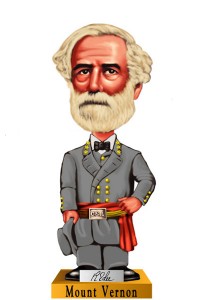 Brendan Wolfe, who both blogs at the Biederbecke Affair and works as the editor of the VFH’s Encyclopedia Virginia [Encyclopedia Virginia Blog], responded to my last post with an incredibly thought-provoking question.
Brendan Wolfe, who both blogs at the Biederbecke Affair and works as the editor of the VFH’s Encyclopedia Virginia [Encyclopedia Virginia Blog], responded to my last post with an incredibly thought-provoking question.
Dear Brendan,
Let’s assume for the sake of argument that by the turn of the twentieth century Americans did indeed have a cultural/political need to exonerate or at least not judge Lee “too harshly.” We don’t have to explain why beyond acknowledging the broad goals of reconciliation and reunion that have been so ably sketched by David Blight. The interesting question for me is whether that could have been carried out without necessarily abandoning the complex set of factors that entered into Lee’s decision, which no doubt included questions of honor and loyalty to his state of Virginia. As historians have made very clear over the past few decades, Lee was also a slaveholder who had a great deal in common with other white southerners who worried about their ability to maintain their human property within the Union.
What I am suggesting is that while I understand the need to use Lee as a point of reconciliation and reunion I have to ask whether or not the way in which it was done involved too great a price. After all, the traditional explanation of Lee’s decision rarely places him within a broader context of how others in his position responded to Fort Sumter and Lincoln’s call for 75,000 men to put down the rebellion. And it rarely explains how concerns over race and slavery entered into his decision. During the postwar era as the image of a slave-less Lee engaged in a simple question of honor ascended into the realm of mythology our memory of slavery as a cause and emancipation as a consequence of the war gradually waned. The reinforcement of the former and the disappearance of the latter helped lay the foundation for the politics of Jim Crow.
Clearly, the traditional story of Lee’s decision did not benefit the overwhelming majority of black Americans. In fact, the inability of African Americans to challenge or even amend our national memory of a slave-less Lee helped solidify the narrative and reinforce our nationalistic tendencies. There is a reason as to why Lee is depicted in the WWII poster with a white serviceman. We can’t even imagine a poster that depicts Lee along with a black soldier even though a significant number served in WWII? Perhaps it’s a stretch but can’t one assume that the slave-less Lee helped to extend the idea of racially segregated military through 1948 and the need on the part of A. Philip Randolph to threaten a march on Washington, D.C. if President Roosevelt did not address discriminatory practices among defense contractors?
I come back to the question of whether it was possible to deal with Lee in a way that might bring about a certain amount of cultural and political healing without losing sight of the important role that race and slavery played in this crucial moment in our nation’s history. Again, did the price of it all have to be emancipation and the bravery of 180,000 former slaves and free blacks? I don’t know the answer to that question, but I appreciate your raising the initial question and I welcome other readers to respond.
Per your instructions, I clicked when I was finished crying, and now I want to make a comment about your post regarding Lee’s decision to resign from the Army and accept a commission from Virginia. I sympathize with your efforts to bring more balance to the historical consideration of this moment; I even sympathize with your tendency to chide men like Al Stone for their myth-steeped take on the Civil War.
But with the name of your blog in mind, I’m wondering if you could take the discussion a step further: What does this “rewriting” of Lee’s decision say about how and why we remember the Civil War? Perhaps we are too quick to turn to “honor” as an explanation, but don’t we have a cultural (and for a time even political) need to exonerate Lee? To bring him back into the American fold by not judging his decision too harshly, by not — as unnamed critics do in the
newspaper article you link to — calling him a traitor?
The myth of Lee may be bad history but it’s also played an important role in putting the country back together again. I know there are all sorts of caveats and potential objections to that last statement, so I’m curious to know what you think.
My response follows.